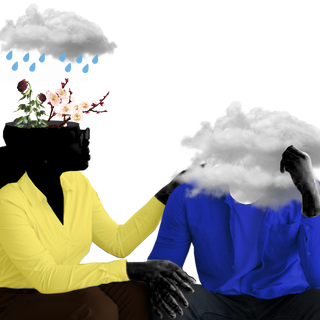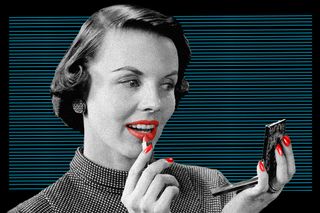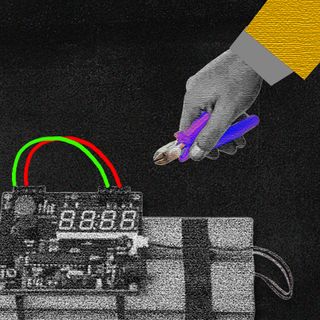
The Relationship Between Make‑Up and Self‑Esteem Is More Nuanced Than It Appears
It is a greater focus on appearance that led the participants to invest more — of both time and money — in make-up use.

“She’s too pretty to be wearing that much make-up!” “If only she had the confidence to look more ‘natural’!” “She must be really insecure about the way she looks! Why else would she be wearing so much make-up?” Each one of these statements — that we’ve probably heard several times in life — suggests a negative association between one’s self-esteem and the amount of make-up they like to use. “Insecure” — besides “vain,” “slutty,” and “ugly” — is an assumption that’s often made of people who choose to put on make-up. However, no matter how deeply we may have been conditioned to draw that link, it might be factually inaccurate, according to a new study.
“[Make-up] has become a security blanket for many girls who worry themselves to death over the idea of someone seeing and commenting on their blemishes and imperfections, and I can honestly say sometimes I’m that girl too,” wrote Kate Ryan, reflecting on her relationship with make-up. But Ryan’s relationship isn’t entirely dictated by their self-esteem. “I enjoy putting on make-up, experimenting with different shades, and messing around, even if I’m not going anywhere. It’s fun, it can be creative and it can be social too,” they added.
In other words, there’s more nuance to the link between one’s affinity for make-up and their self-esteem, than popular perception acknowledges. Published in PLOS One, the new study attempted to delve precisely into that nuance through a survey of almost 1,500 women from Brazil, who were quizzed on their make-up usage, body image, and self-esteem — both general and social. It is the distinction between the two kinds of self-esteem measured by the researchers that forms a core part of the study.
Explaining the difference between the parameters and their relevance to the research, the study says, “Whereas general self-esteem reflects how a person feels about themselves and their value in comparison to others, social self-esteem is how individuals feel about themselves during social interactions with others, and how those interactions affect their social value. In this way, social self-esteem is more affected by social interactions than general self-esteem.”
Related on The Swaddle:
Our Obsession With Every Cannes Look Reveals Our Need for Validation From the West
Turns out, the participants who scored higher in their general self-esteem questionnaire, spent less money on make-up. On the other hand, participants who had greater social self-esteem, spent more money on make-up. “Overall, our study suggested that women with greater self-esteem associated with social interactions would attribute higher importance to their appearance, resulting in more make-up usage,” the researchers noted.
According to them, it is a greater focus on appearance that led the participants to invest more — of both time and money — in make-up use. As PsyPost explains, though, being fixated on one’s appearance can pave the path for negative outcomes like eating disorders; at the same time, make-up can, perhaps, help boost one’s confidence about the way they look, resulting in a not-so-terrible outcome.
“[W]hat’s wrong with wanting to control our image, isn’t that empowering?,” Ryan had written, arguing, “If you don’t need make-up to feel beautiful and confident, and if you can walk down the halls not caring what others think, fair play to you. That’s brilliant and I desperately wish I could too. Just don’t judge the girls who don’t have that luxury of that self-assurance.”
Additionally, when stripped of the cultural presumptions, make-up can indeed be a way to experiment with one’s creativity and even express one’s identity. For some, it is the only moment of isolation they use to connect with themselves; for others, the face becomes a canvas to show art.
Further, evidently, self-esteem itself appears to be a concept whose complexities and their impact on our behavior we, as the masses, have yet to grasp. A 2018 study exploring the link between self-esteem and make-up also concluded that one’s usage of make-up isn’t necessarily linked negatively to one’s self-esteem. “Positive self-esteem tends to lead to a strong desire to follow leading make-up trend[s], whereas negative self-esteem seeks pleasure through make-up [to] transform one’s feelings of inferiority and depression into positive emotions,” it had noted.
Related on The Swaddle:
Beauty Norm Rebellions in 2020 Redefined Beauty — But Didn’t Eliminate It
Moreover, we continue to live in a world where gender and beauty norms still reign supreme in several quarters — with women wearing make-up even being perceived as more trustworthy, compared to women without make-up, by both men and women, according to past research. Naturally, then, one’s motivation for wearing make-up can vary greatly. As such, opining on the way self-esteem influences people’s make-up habits, seems rather naive.
Indeed, it might be the unrealistic beauty standards peddled by the beauty industry that drives women toward greater usage. But criticizing the women, who are probably trying to cope with the resultant low self-esteem, for not being resilient enough to withstand the beauty industry’s gimmicks, and giving in to make-up usage instead, seems grossly unfair. It’s like insulting a woman by saying she has “daddy issues,” rather than blaming her father who is to be faulted for failing her in her formative years.
“The norms of appearance dictate that a woman must look immaculate and unblemished — but naturally so… If a woman wears too much make-up, the natural conclusion to be drawn is that she is vain, vapid, shallow, insecure, ugly, and has low self-esteem. On the other hand, when a woman ditches make-up completely, the spectrum of reactions she evokes range from being asked whether she is sick or depressed, to being called ‘a bra-burning feminist,’ to being advised to add a little flush of color to her cheeks and lips,” notes an article from 2019.
Basically, we prize women who are “effortlessly” pretty, and in turn, deride people for trying to conform to unfair standards patriarchy sets in the first place.
So, as Ryan had rightfully argued, “We can blame the media’s obsession with beauty and the pressure to appeal to the opposite sex for making us wear make-up, which apparently destroys our body image, but what can really hurt our body image is not make-up, but other people’s attitudes towards whatever our choice may be about our image.”
Devrupa Rakshit is an Associate Editor at The Swaddle. She is a lawyer by education, a poet by accident, a painter by shaukh, and autistic by birth. You can find her on Instagram @devruparakshit.
Related


New Research Shows Why Decisive People Don’t Necessarily Make Better Choices
